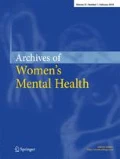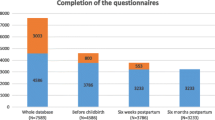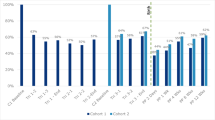Abstract
Whether there has been an increase in postpartum depression (PPD) over the generation remains unknown. This study aimed to compare the prevalence in two cohorts of young Australian women born 17 years apart and identified the factors associated with any generational differences. Participants were from the Australian Longitudinal Study on Women’s Health, who gave birth between ages 18 and 27 (born in 1973–78 and 1989–95). PPD prevalence was calculated as the percentage of births associated with PPD. Both the prevalence of PPD diagnoses (among 1,610 births) and PPD symptoms (among 953 births) were compared. Relative risks (RRs) and 95% confidence intervals (CIs) were used to report generational differences in the prevalence for PPD diagnoses; Hazard ratios (HRs) and 95% CIs used for PPD symptoms. Factors that differed between cohorts and were associated with PPD diagnoses or PPD symptoms were adjusted. The prevalence of both PPD diagnoses (21.4% vs 10.3%; crude RR: 2.03, 95% CI: 1.59–2.60) and symptoms (20.1% vs 13.3%; crude HR: 1.60, 95% CI: 1.15–2.34) were higher in the 1989–1995 cohort than the 1973–1978 cohort. Generational differences in PPD diagnoses persisted after controlling for potential contributors (RR: 1.53, 95% CI: 1.15–2.04), while generational differences in PPD symptoms were attenuated (HR: 0.98, 95% CI: 0.64–1.49). Of all contributing factors, a history of depression explained most of the generational differences, especially in PPD symptoms (49%), to the extent that when the study sample was stratified by history of depression, no generational differences were detected (without prior depression, HR: 0.65, 95% CI: 0.20–2.08; with prior depression, HR: 1.18, 95% CI: 0.71–1.96). The higher prevalence of PPD in the recent generation was mainly due to the high prevalence of depression. Strategies that well manage pre-existing depression may benefit the prevention of PPD for the current young generation. Further research is warranted to inform detailed prevention approaches.

Similar content being viewed by others
Data availability
Data may be made available to collaborating researchers where there is a formal request to make use of the material. Please find details at http://www.alswh.org.au/how-to-access-the-data/alswh-data.
References
American Psychiatric Association (2013) Highlights of changes from DSM-IV-TR to DSM-5. https://www.psychiatry.org/File%20Library/Psychiatrists/Practice/DSM/APA_DSM_Changes_from_DSM-IV-TR_-to_DSM-5.pdf. Accessed 3 December 2020
Anthony J (2019) More Australians are diagnosed with depression and anxiety but it doesn’t mean mental illness is rising. The Conversation. https://theconversation.com/more-australians-are-diagnosed-with-depression-and-anxiety-but-it-doesnt-mean-mental-illness-is-rising-120824. Accessed 30 July 2019
Aulike I, Dobson A, Egwunye J, Fitzgerald D, Mishra G (2020) Assessing agreement between the K10 and MHI-5 measures of psychological wellbeing. Appl Res Qual Life. https://doi.org/10.1007/s11482-020-09843-0
Australian Bureau of Statistics (2017) Census reveals insights into Australia’s labour force. https://www.abs.gov.au/ausstats/abs@.nsf/mediareleasesbyReleaseDate/7E56B97A3FEF932ACA2581BF00364712?OpenDocument. Accessed 10 December 2020
Australian Bureau of Statistics (2018) Happy Mother's Day from the ABS! ABS. https://www.abs.gov.au/ausstats/abs@.nsf/mediareleasesbyReleaseDate/168BFDA0C45F98A8CA258288001A58C5?OpenDocument. Accessed 20 May 2020
Australian Institute of Health and Welfare (2019) Australia’s mothers and babies 2017 - in brief. AIHW. https://www.aihw.gov.au/getmedia/2a0c22a2-ba27-4ba0-ad47-ebbe51854cd6/aihw-per-100-in-brief.pdf.aspx?inline=true. Accessed 20 May 2020
Banti S et al (2011) From the third month of pregnancy to 1 year postpartum. Prevalence, incidence, recurrence, and new onset of depression. Results from the perinatal depression-research & screening unit study. Compr Psychiatry 52:343–351. https://doi.org/10.1016/j.comppsych.2010.08.003
Batt MM, Duffy KA, Novick AM, Metcalf CA, Epperson CN (2020) Is Postpartum Depression Different From Depression Occurring Outside of the Perinatal Period? A Review of the Evidence. Focus (am Psychiatr Publ) 18:106–119. https://doi.org/10.1176/appi.focus.20190045
Bell S, Lee C (2002) Development of the Perceived Stress Questionnaire for Young Women. Psychol Health Med 7:189–201. https://doi.org/10.1080/13548500120116085
Berwick DM, Murphy JM, Goldman PA, Ware JE Jr, Barsky AJ, Weinstein MC (1991) Performance of a five-item mental health screening test. Med Care 29:169–176. https://doi.org/10.1097/00005650-199102000-00008
Beydoun HA, Beydoun MA, Kaufman JS, Lo B, Zonderman AB (2012) Intimate partner violence against adult women and its association with major depressive disorder, depressive symptoms and postpartum depression: a systematic review and meta-analysis. Soc Sci Med 75:959–975. https://doi.org/10.1016/j.socscimed.2012.04.025
Bilszta J, Ericksen J, Buist A, Milgrom J (2010) Women’s experience of postnatal depression - beliefs and attitudes as barriers to care. Aust J Adv Nurs 27:44–54
Brault M-C, Meuleman B, Bracke P (2012) Depressive symptoms in the Belgian population: disentangling age and cohort effects. Soc Psychiatry Psychiatr Epidemiol 47:903–915. https://doi.org/10.1007/s00127-011-0398-0
Cao S, Jones M, Tooth L, Mishra G (2021) Does premenstrual syndrome before pregnancy increase the risk of postpartum depression? Findings from the Australian Longitudinal Study on Women’s Health. J Affect Disord 279:143–148. https://doi.org/10.1016/j.jad.2020.09.130
Centre of Perinatal Excellence (2017) Mental health care in the perinatal period: Australian clinical practice guideline. Centre of Perinatal Excellence, Melbourne
Chandola T, Booker CL, Kumari M, Benzeval M (2019) Are flexible work arrangements associated with lower levels of chronic stress-related biomarkers? A study of 6025 employees in the UK Household Longitudinal Study. Sociology 53:779–799. https://doi.org/10.1177/0038038519826014
Collishaw S, Maughan B, Natarajan L, Pickles A (2010) Trends in adolescent emotional problems in England: a comparison of two national cohorts twenty years apart. J Child Psychol Psychiatry 51:885–894. https://doi.org/10.1111/j.1469-7610.2010.02252.x
Cooper PJ, Murray L (1995) Course and Recurrence of Postnatal Depression: Evidence for the Specificity of the Diagnostic Concept. Br J Psychiatry 166:191–195. https://doi.org/10.1192/bjp.166.2.191
Cui M et al (2020) Prenatal tobacco smoking is associated with postpartum depression in Japanese pregnant women: The japan environment and children’s study. J Affect Disord 264:76–81. https://doi.org/10.1016/j.jad.2019.11.145
Davis K, Pearlstein T, Stuart S, O’Hara M, Zlotnick C (2013) Analysis of brief screening tools for the detection of postpartum depression: comparisons of the PRAMS 6-item instrument, PHQ-9, and structured interviews. Arch Womens Ment Health 16:271–277. https://doi.org/10.1007/s00737-013-0345-z
Dekel S et al (2019) The dynamic course of peripartum depression across pregnancy and childbirth. J Psychiatr Res 113:72–78. https://doi.org/10.1016/j.jpsychires.2019.03.016
Di Florio A et al (2014) Mood disorders and parity - a clue to the aetiology of the postpartum trigger. J Affect Disord 152–154:334–339. https://doi.org/10.1016/j.jad.2013.09.034
Dobson AJ et al (2015) Cohort Profile Update: Australian Longitudinal Study on Women’s Health. Int J Epidemiol 44(1547):1547a–1547f. https://doi.org/10.1093/ije/dyv110
Eckersley R, Dear K (2002) Cultural correlates of youth suicide. Soc Sci Med 55:1891–1904. https://doi.org/10.1016/s0277-9536(01)00319-7
França UL, McManus ML (2018) Frequency, trends, and antecedents of severe maternal depression after three million U.S. births. PLoS ONE 13:e0192854–e0192854. https://doi.org/10.1371/journal.pone.0192854
Gandek B, Ware JE (1993) SF-36 Health Survey: Manual and interpretation guide. The Health institute, New England Medical Center, Boston
Gjerdingen D, Crow S, McGovern P, Miner M, Center B (2011) Changes in depressive symptoms over 0–9 months postpartum. J Womens Health (larchmt) 20:381–386. https://doi.org/10.1089/jwh.2010.2355
Grissette BG, Spratling R, Aycock DM (2018) Barriers to Help-Seeking Behavior Among Women With Postpartum Depression. J Obstet Gynecol Neonatal Nurs 47:812–819. https://doi.org/10.1016/j.jogn.2018.09.006
Guintivano J, Manuck T, Meltzer-Brody S (2018) Predictors of Postpartum Depression: A Comprehensive Review of the Last Decade of Evidence. Clin Obstet Gynecol 61:591–603. https://doi.org/10.1097/GRF.0000000000000368
Hahn-Holbrook J, Cornwell-Hinrichs T, Anaya I (2017) Economic and Health Predictors of National Postpartum Depression Prevalence: A Systematic Review, Meta-analysis, and Meta-Regression of 291 Studies from 56 Countries. Front Psychiatry 8:248–248. https://doi.org/10.3389/fpsyt.2017.00248
Halbreich U, Karkun S (2006) Cross-cultural and social diversity of prevalence of postpartum depression and depressive symptoms. J Affect Disord 91:97–111. https://doi.org/10.1016/j.jad.2005.12.051
Is there really an epidemic of depression? (2008) Springer Nature. https://www.scientificamerican.com/article/really-an-epidemic-of-depression/. Accessed 24 November 2020
Jackson CA, Mishra GD, Tooth L, Byles J, Dobson A (2015) Moderate agreement between self-reported stroke and hospital-recorded stroke in two cohorts of Australian women: a validation study. BMC Med Res Methodol 15:7. https://doi.org/10.1186/1471-2288-15-7
Kakoly NS, Earnest A, Teede HJ, Moran LJ, Joham AE (2019) The impact of obesity on the incidence of type 2 diabetes among women with polycystic ovary syndrome. Diabetes Care 42:560–567. https://doi.org/10.2337/dc18-1738
Kasser T, Ryan RM (1996) Further examining the American dream: Differential correlates of intrinsic and extrinsic goals. Pers Soc Psychol Bull 22:280–287. https://doi.org/10.1177/0146167296223006
Kessler RC et al (2002) Short screening scales to monitor population prevalences and trends in non-specific psychological distress. Psychol Med 32:959–976. https://doi.org/10.1017/s0033291702006074
Ko JY, Rockhill KM, Tong VT, Morrow B, Farr SL (2017) Trends in postpartum depressive symptoms - 27 states, 2004, 2008, and 2012. MMWR Morbidity and mortality weekly report 66:153–158. https://doi.org/10.15585/mmwr.mm6606a1
Koric A et al (2021) Polycystic ovary syndrome and postpartum depression symptoms: a population-based cohort study. Am J Obstet Gynecol 224:591.e591-591.e512. https://doi.org/10.1016/j.ajog.2020.12.1215
LaCoursiere DY, Barrett-Connor E, O’Hara MW, Hutton A, Varner MW (2010) The association between prepregnancy obesity and screening positive for postpartum depression. BJOG Int J Obstet Gynaecol 117:1011–1018. https://doi.org/10.1111/j.1471-0528.2010.02569.x
Losoncz I, Bortolotto N (2014) Work-life balance: The experiences of Australian working mothers. J Fam Stud 15:122–138. https://doi.org/10.5172/jfs.15.2.122
Loxton D et al (2018) Cohort Profile: The Australian Longitudinal Study on Women’s Health (ALSWH) 1989–95 cohort. Int J Epidemiol 47:391–392e. https://doi.org/10.1093/ije/dyx133
McCall-Hosenfeld JS, Phiri K, Schaefer E, Zhu J, Kjerulff K (2016) Trajectories of depressive symptoms throughout the peri- and postpartum period: Results from the First Baby Study. J Womens Health (larchmt) 25:1112–1121. https://doi.org/10.1089/jwh.2015.5310
McGrath M, Quint EH, Weyand AC (2021) Depression in adolescents and young adults with heavy menstrual bleeding in a referral clinic setting. Am J Hematol 96:E105-e108. https://doi.org/10.1002/ajh.26093
Moss KM, Reilly N, Dobson AJ, Loxton D, Tooth L, Mishra GD (2020) How rates of perinatal mental health screening in Australia have changed over time and which women are missing out. Aust N Z J Public Health 44:301–306. https://doi.org/10.1111/1753-6405.12999
Muchanga SMJ et al (2017) Preconception gynecological risk factors of postpartum depression among Japanese women: The Japan Environment and Children’s Study (JECS). J Affect Disord 217:34–41. https://doi.org/10.1016/j.jad.2017.03.049
Najman JM, Bor W, Williams GM, Middeldorp CM, Mamun AA, Clavarino AM, Scott JG (2021) Does the millennial generation of women experience more mental illness than their mothers? BMC Psychiatry 21:359. https://doi.org/10.1186/s12888-021-03361-5
National Institute for Health and Care Excellence (2014) Antenatal and postnatal mental health: clinical management and service guidance. https://www.nice.org.uk/guidance/cg192. Accessed 2 February 2021
Patton GC et al (2015) Prediction of perinatal depression from adolescence and before conception (VIHCS): 20-year prospective cohort study. Lancet (london, England) 386:875–883. https://doi.org/10.1016/s0140-6736(14)62248-0
Pearson RM et al (2018) Prevalence of prenatal depression symptoms among 2 generations of pregnant mothers: The Avon Longitudinal Study of Parents and Children. JAMA Netw Open 1:e180725. https://doi.org/10.1001/jamanetworkopen.2018.0725
Pitt B (1968) “Atypical” depression following childbirth. Br J Psychiatry 114:1325–1335
Rasmussen MH, Strom M, Wohlfahrt J, Videbech P, Melbye M (2017) Risk, treatment duration, and recurrence risk of postpartum affective disorder in women with no prior psychiatric history: A population-based cohort study. PLoS Med 14:e1002392. https://doi.org/10.1371/journal.pmed.1002392
Razurel C, Kaiser B, Dupuis M, Antonietti JP, Sellenet C, Epiney M (2013) Validation of the postnatal perceived stress inventory in a French speaking population of primiparous women. J Obstet Gynecol Neonatal Nurs 42:685–696. https://doi.org/10.1111/1552-6909.12251
Segre LS, Davis WN (2013) Postpartum Depression and Perinatal Mood Disorders in the DSM. https://www.postpartum.net/wp-content/uploads/2014/11/DSM-5-Summary-PSI.pdf. Accessed 2 June 2018
Sequeira ME, Lewis SJ, Bonilla C, Smith GD, Joinson C (2017) Association of timing of menarche with depressive symptoms and depression in adolescence: Mendelian randomisation study. Br J Psychiatry J Ment Sci 210:39–46. https://doi.org/10.1192/bjp.bp.115.168617
Silveira E, Taft C, Sundh V, Waern M, Palsson S, Steen B (2005) Performance of the SF-36 Health Survey in Screening for Depressive and Anxiety Disorders in an Elderly Female Swedish Population. Qual Life Res 14:1263–1274. https://doi.org/10.1007/s11136-004-7753-5
Silverman ME, Reichenberg A, Lichtenstein P, Sandin S (2019) Is depression more likely following childbirth? A population-based study. Arch Womens Ment Health 22:253–258. https://doi.org/10.1007/s00737-018-0891-5
Silverman ME et al (2017) The risk factors for postpartum depression: A population-based study. Depress Anxiety 34:178–187. https://doi.org/10.1002/da.22597
Stewart DE, Vigod S (2016) Postpartum Depression. N Engl J Med 375:2177–2186. https://doi.org/10.1056/NEJMcp1607649
Stewart DE, Vigod SN (2019) Postpartum Depression: Pathophysiology, Treatment, and Emerging Therapeutics. Annu Rev Med 70:183–196. https://doi.org/10.1146/annurev-med-041217-011106
Streiner DL, Cairney J (2007) What’s under the ROC? An introduction to receiver operating characteristics curves. Can J Psychiatry 52:121–128. https://doi.org/10.1177/070674370705200210
Sylvén SM, Thomopoulos TP, Kollia N, Jonsson M, Skalkidou A (2017) Correlates of postpartum depression in first time mothers without previous psychiatric contact. Eur Psychiatry 40:4–12. https://doi.org/10.1016/j.eurpsy.2016.07.003
Tebeka S, Strat Yann L, Dubertret C (2016) Developmental trajectories of pregnant and postpartum depression in an epidemiologic survey. J Affect Disord 203:62–68. https://doi.org/10.1016/j.jad.2016.05.058
Twenge JM (2015) Time Period and Birth Cohort Differences in Depressive Symptoms in the U.S., 1982–2013. Soc Indic Res 121:437–454. https://doi.org/10.1007/s11205-014-0647-1
Twenge JM, Gentile B, DeWall CN, Ma D, Lacefield K, Schurtz DR (2010) Birth cohort increases in psychopathology among young Americans, 1938–2007: A cross-temporal meta-analysis of the MMPI. Clin Psychol Rev 30:145–154. https://doi.org/10.1016/j.cpr.2009.10.005
US Preventive Services Task Force (2019) Interventions to Prevent Perinatal Depression: US Preventive Services Task Force Recommendation Statement. JAMA 321:580–587. https://doi.org/10.1001/jama.2019.0007
Viguera A (2018) Postpartum unipolar major depression: Epidemiology, clinical features, assessment, and diagnosis. https://www.uptodate.com/contents/postpartum-unipolar-major-depression-epidemiology-clinical-features-assessment-and-diagnosis#H4004681033. Accessed 28 June 2018
Viguera A (2021a) Severe postpartum unipolar major depression: Choosing treatment. https://www.uptodate.com/contents/severe-postpartum-unipolar-major-depression-choosing-treatment?search=postpartum%20depression&source=search_result&selectedTitle=3~124&usage_type=default&display_rank=3#H1656261266. Accessed 19 May 2021
Viguera A (2021b) Mild to moderate postpartum unipolar major depression: Treatment. https://www.uptodate.com/contents/mild-to-moderate-postpartum-unipolar-major-depression-treatment?search=postpartum%20depression&source=search_result&selectedTitle=2~124&usage_type=default&display_rank=2. Accessed 19 May 2021
Viner RM, Gireesh A, Stiglic N, Hudson LD, Goddings A-L, Ward JL, Nicholls DE (2019) Roles of cyberbullying, sleep, and physical activity in mediating the effects of social media use on mental health and wellbeing among young people in England: a secondary analysis of longitudinal data. Lancet Child Adolescent Health 3:685–696. https://doi.org/10.1016/S2352-4642(19)30186-5
Woolhouse H, Gartland D, Hegarty K, Donath S, Brown SJ (2012) Depressive symptoms and intimate partner violence in the 12 months after childbirth: a prospective pregnancy cohort study. BJOG Int J Obstet Gynaecol 119:315–323. https://doi.org/10.1111/j.1471-0528.2011.03219.x
Xu F, Sullivan EA, Li Z, Burns L, Austin MP, Slade T (2014) The increased trend in mothers’ hospital admissions for psychiatric disorders in the first year after birth between 2001 and 2010 in New South Wales. Australia BMC Womens Health 14:119. https://doi.org/10.1186/1472-6874-14-119
Acknowledgements
The research on which this paper is based was conducted as part of the Australian Longitudinal Study on Women’s Health by the University of Queensland and the University of Newcastle. We are grateful to the Australian Government Department of Health for funding and to the women who provided the survey data.
Funding
This work was supported by the Australian Government Department of Health. Sifan Cao holds the UQ Research Training Scholarship. Gita Devi Mishra is supported by the National Health and Medical Research Council Principal Research Fellowship (APP1121844). The funders had no role in study design, data collection and analysis, preparation of the manuscript, or decision to publish.
Author information
Authors and Affiliations
Contributions
Sifan Cao, Mark Jones, Leigh Tooth, and Gita Devi Mishra designed the study; Sifan Cao, Mark Jones and Gita Devi Mishra finalised the statistical plan; Sifan Cao conducted the statistical analysis and drafted the paper under the supervision of Mark Jones, Leigh Tooth, and Gita Devi Mishra; all co-authors edited the draft of the paper.
Corresponding author
Ethics declarations
Ethical Approval and Consent
Ethical approvals for the project were granted from the Human Research Ethics Committees of the University of Newcastle (Approval No. H-076–0795) and the Medical Research Ethics Committee of the University of Queensland (Approval No. 2004000224 and 2012000950). All participants gave signed informed consent, and all data used in the analyses were de-identified.
Competing Interests
The author(s) declared no potential conflicts of interest with respect to the research, authorship, and/or publication of this article.
Additional information
Publisher's Note
Springer Nature remains neutral with regard to jurisdictional claims in published maps and institutional affiliations.
Supplementary Information
Below is the link to the electronic supplementary material.
Rights and permissions
About this article
Cite this article
Cao, S., Jones, M., Tooth, L. et al. Generational differences in the prevalence of postpartum depression among young Australians: a comparison of two cohorts born 17 years apart. Arch Womens Ment Health 25, 199–214 (2022). https://doi.org/10.1007/s00737-021-01182-9
Received:
Accepted:
Published:
Issue Date:
DOI: https://doi.org/10.1007/s00737-021-01182-9




